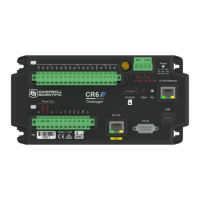10.4.57 RS232Timeout
RS-232 hardware handshaking timeout. Specifies the time (tens of ms) that the CR6 will wait
between packets if CTS is not asserted.
10.4.58 Security(1), Security(2), Security(3)
An array of three security codes. A value of zero for a given level will grant access to that level's
privileges for any given security code. For more information, see Data logger security (p. 111).
10.4.59 ServicesEnabled
Discontinued; replaced by/aliased to HTTPEnabled, PingEnabled, TelnetEnabled.
10.4.60 TCPClientConnections
Discontinued; replaced by / aliased to PakBusTCPClients.
10.4.61 TCP_MSS
The maximum TCP segment size. This value represents the maximum TCP payload size. It is used
to limit TCP packet size. A maximum TCP transmission unit (MTU) can be calculated by adding
the IP Header size (20 bytes), the TCP Header size (20 bytes), and the payload size.
10.4.62 TCPPort
Discontinued; replaced by / aliased to PakBusPort.
10.4.63 TelnetEnabled
Enables (1) or disables (0) the Telnet service.
10.4.64 TLSConnections
This setting controls the number of concurrent TLS (secure or encrypted) client socket
connections that the data logger will be capable of handling at any given time. This will affect
FTPS and HTTPS services. This count will be increased by the number of DNP() instructions in
the data logger program.
This setting will control the amount of RAM that the data logger will use for TLS connections. For
every connection, approximately 20KBytes of RAM will be required. This will affect the amount of
memory available for program and data storage. Changing this setting will force the data logger
to recompile its program so that it can reallocate memory
10. Information tables and settings (advanced) 186

